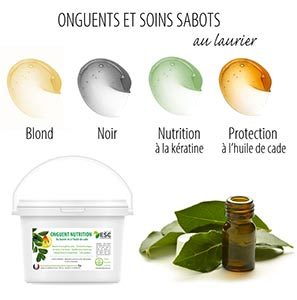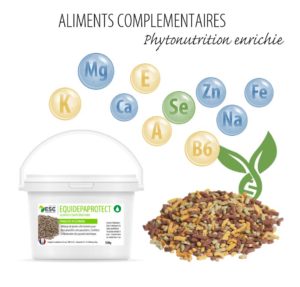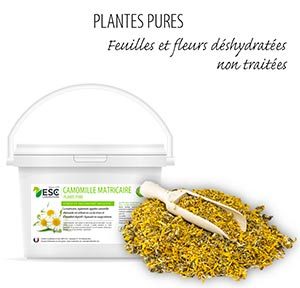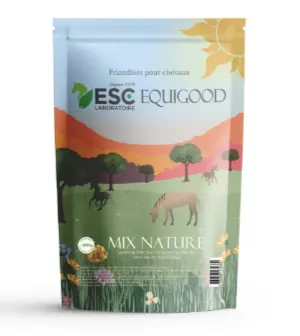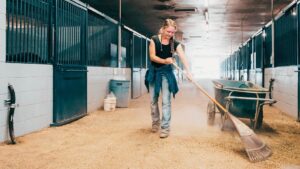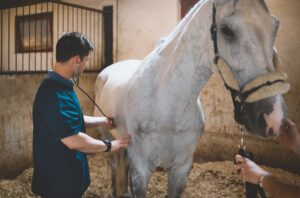The emphysema of the horse is a respiratory condition difficult to cure entirely.
If you notice that your horse is more slippery at work, whether his breathing is different or coughing abnormally, Maybe because he's suffering from emphysema.
It is often understood that this respiratory condition is incurable and that it is very difficult to fully heal an emphysematous horse. But it is still possible to limit your horse's seizures, to relieve it naturally and to help him regain better health by taking simple small gestures on a daily basis.
We'll explain. how to manage the environment, food and lifestyle a horse suffering from emphysema. You will see that small reflexes in the way you care for your animal can greatly improve its respiratory comfort!
Horse emphysema: how to recognize it?
Emphysema in horses is a a syndrome that mainly affects horses over 7 years of age and especially those living inside. It is also known as Recurrent airway obstruction in English (RAO), but also chronic obstructive bronchopneumopathy (OCOC). Younger horses may suffer from equine asthma, so we talk about Inflammatory airway disease (or IAD).
Specifically, It is characterized by difficulty breathing (We're talking dyspnoea).
It is often called this affection, it grows, Because the horse having difficulty expelling air from his lungs will expire by contracting his abdominal muscles. The latter will gradually develop abnormally, which will form a ridge along the costal arch of your horse called shoot line. This pathology of the horse is easily identifiable when looking at the side flanks.
Emphysema is characterized by a succession of phases of remission and crises. It is an evolutionary pathology which unfortunately cannot be cured.
The main symptoms that can alert
This singular expiration, raison pour laquelle on appelle « pousse » l’emphysème chez le cheval, est un signe distinctif de la maladie.
It is done in two stages: a time « Normal » and a second during which the muscles « grow » to get air out of the lungs.
But it's not the only symptom to watchr for Diagnosis emphysema. You will also notice that his nasals are particularly dilated sometimes even at rest if the horse is in crisis, that your horse is breathless during effort, or that he can no longer work as usual. Coughing is also a common symptom.
Other signs which may indicate that your horse suffers from emphysema :
- Tachypnea, i.e. an increase in respiratory frequency
- Bilateral throwing: it is secretions (mucus) coming out of the noses
- Weight loss when emphysema is not treated quickly enough. Your horse needs more energy to breathe. This will speed up the burning of calories consumed, thus causing progressive but noticeable weight loss.
Risk factors and causes of horse emphysema
Emphysema is a particularly embarrassing condition for your horse, or even a handicap. Before you get interested in the different treatments that will allow you to treat it, it is therefore It is important to know its main causes in order to prevent it.
Emphysema is the result of chronic inflammation lungs. When your horse's lungs are inflammatory, his body releases chemical and cellular mediators that will cause thickening of the respiratory mucosa and strong mucus production. As a result, the horse will accumulate and the body of your horse will have more difficulty eliminating it.
In the long term, inflammation may even cause irreversible damage and loss of lung elasticity.
Most often, it is caused by hypersensitivity of your horse to hay. Especially dust, mites, or moulds that develop there. When your horse inhales these agents, it may develop an allergy to its respiratory system. This pulmonary inflammation may also result from repeated exposure to irritating factors such as dust from indoor stables or ammonia vapours released from urine.
We often talk aboutseasonal emphysema. It is most often triggered in winter, when your horse spends more time in its box. But chronic inflammation of the lungs can also be caused by pollen allergy, and therefore be more visible in spring.
This hypersensitivity can be genetic, as are many allergies in horses.
How to relieve a horse with chronic cough?
All the interest of recognizing as soon as possible the emphysema in the horse is to be able to provide it with care as quickly as possible and adjustments necessary to relieve it, prevent its crises from worsening and keeping it healthy.
It has already been said, but prolonged obstruction of the bronchi can eventually cause irreversible damage. Even more so than it can be reduced quite easily by adopting simple gestures to adapt the diet, lifestyle and environment of horses.
Discover our natural complement to relieve your horse.
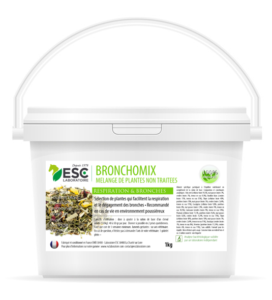
Changing the diet of an emhysematic horse
If your horse suffers from emphysema, it is imperative to give it wet hay or enruban in order to limit the maximum exposure to dust and mould.
You can also complement your horse with plants known to improve breathing. This is the case in particular Tussiing, whose rich mucilage makes it an effective remedy in case of respiratory difficulty and especially against chronic cough. Our mix of plants Bronchomix and our Supplement Equipum reinforcement You will also be able to relieve your horse thanks to its plants with expectorant and antitussive properties.
In case of a crisis, our Equipum syrup will be a valuable help pending the intervention of your veterinarian. Finally, apply our nasal balm to essential oils Equinasal before work will prove useful if the soil is dusty.
Adapt the environment of your horse
It's not always possible to leave your horse out all day. So we'll have to make sure that his box is as healthy as possible so as not to worsen the symptoms of the disease.
Of course, this requires good ventilation of the space, but also good hygiene and regular maintenance (preferably daily) of litter to limit ammonia. It is not only beneficial for the horse affected by emphysema, but also for its neighbours, who can undergo the emanations. During box maintenance or curing, avoid leaving the horse inside. Same for dressing.
Another very important point, and for reduce your horse's exposure to dust : Distance it to the maximum from the straw reserve. The concentration of organic dust is 35 times greater in straw litter or in the environment of horses fed hay than in wood chips. It is also necessary to move away from the pile of manure that releases a lot of dust, mould and ammonia vapour.
A good alternative is to replace straw with dusted wood chips. Indeed, even a straw of superior quality contains dust (even if in a much lower quantity). A wooden bedding litter will reduce dust exposure, ammonia fumes and is much easier to keep clean.
Adapt the lifestyle (and work) of a horse suffering from emphysema
You can also limit the evolution of this respiratory condition by adapting your horse's lifestyle and physical activity. So think about reducing your training (especially in winter, when the disease is often at its peak). A good warm-up at the beginning of work is also advised. Just like regular breaks during each session to allow your horse to regulate its breathing and thus maximize its comfort.
Possible treatments for an emphysematous horse
Emphysema is a serious respiratory disease. To prevent and treat it at best, you can make a search for allergen in your horse. If it has allergies, you can then give it skin desensitisation treatments.
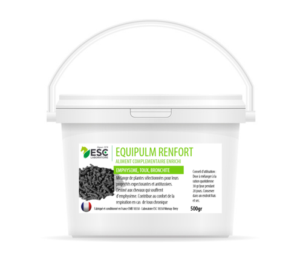
For the most advanced cases, your veterinarian can advise you corticosteroid-based treatment to reduce acute inflammation quickly and effectively. The animal can also be placed in bronchodilators (usually syrup) to improve its respiratory efficiency.
Néanmoins, this type of treatment cannot be used in the long term, mainly due to its many side effects. Doses of corticosteroids should therefore be gradually reduced and doses spaced.
To improve the respiratory comfort of your horse, you can turn to herbal therapy. The plant kingdom is full of plants with soothing, expectorant and antitussive properties. They are therefore particularly suitable for horses suffering from emphysema. If possible, these treatments should be administered directly in the respiratory tract by nebulization. This route of administration is to be preferred because it offers good results while severely limiting the side effects of drugs.
Our mix of plants to relieve horse emphysema
There are plants known for their soothing properties of the respiratory tract.
Our laboratory has developed a mixture of plants, in the form of dry plants or small granules Mix with the ration. They are selected for their soothing properties that contribute to the support of the bronchi in case of recurrent breathing difficulties. You can also fill it ina cure for a syrup concentrated with expectorant and decongestant plants to effectively clear its respiratory tract.
Our experts also offer a balm with essential oils to be applied to the inlet of the nose before possible exposure to dust.
Does your horse have respiratory problems? Discover our range of natural supplements to relieve him!
Frequently asked questions about emphysema
What is horse emphysema?
Imphysema in the horse, which is also called Recurrent airway obstruction In English (RAO) is a respiratory condition characterized by difficulty breathing.
How can I treat a horse with emphysema?
To relieve a horse that has emphysema, you must first adapt its environment (to clean up its box), its diet and its way of life. Its preventive measures may, in the most serious cases, be supplemented by appropriate treatment or supplementation.
How do I know if his horse makes emphysema?
Emphysema is characterized by a singular expiration. It is done in two stages: a time « Normal » and a second during which the muscles « grow » to get air out of the lungs. Another symptom to watch is the expansion of the nose and the fact that the horse is quickly breathless during the exercise.



